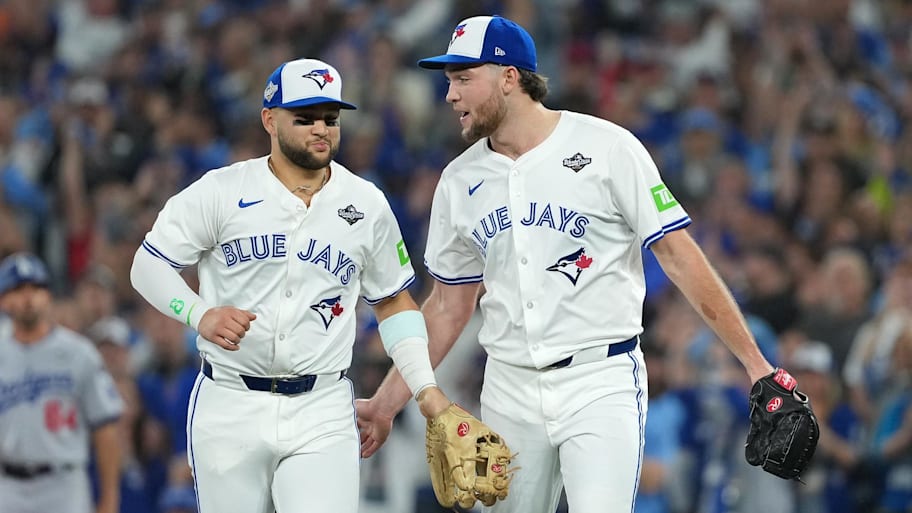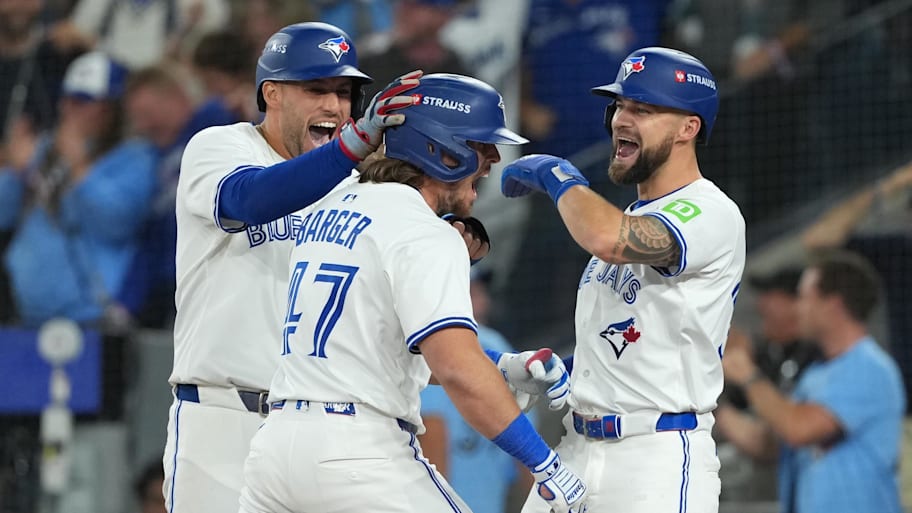TORONTO — In the end, the biggest ovation of the night might have come after an out. There had been so much to cheer already as the Blue Jays pecked away at the Dodgers’ lead, their bullpen and their sense of invincibility. Rogers Centre shook after the home runs. It roared at the run-scoring singles. It rocked at the walks and the great plays and the filthy pitches. And in an 11–4 romp over L.A. in Canada’s first World Series game in 32 years, there were plenty of those. But it was after Daulton Varsho flied to left field to end the six-hit, nine-run, game-deciding sixth inning that the sellout crowd of 44,353 rose to its feet as one and applauded.
They appreciated what was happening in the first World Series game in Canada since Joe Carter hit the biggest home run in Fall Classic history in 1993, and the first World Series game played by the defending champion since the Phillies tried and failed to make it two straight in 2009. And they appreciated how it was happening, in classic Blue Jays fashion: at-bats that felt like a test of endurance, hard contact up the middle and then devastating slug. No one struck out in the inning (and the Jays were rung up just four times all game). Everyone but Ernie Clement—who drove in the first run of the inning but was erased on a fielder’s choice—scored. Addison Barger added the first pinch-hit grand slam in World Series history. It marked the most runs scored in a single Fall Classic inning since 1968. Carter is scheduled to throw out the first pitch of Game 2; they should have brought him out early and let him tee off against the Dodgers’ bullpen.
ADDISON BARGER
— MLB (@MLB) October 25, 2025
PINCH-HIT
GRAND SLAM#WORLDSERIES pic.twitter.com/REg58MNosp
Amid sport-wide consternation over whether the Dodgers and their record $329 million payroll are ruining baseball, it was easy to miss just how good a baseball team the Blue Jays are. Sure, the Dodgers’ lineup begins with three Hall of Famers—two-way superstar Shohei Ohtani, self-made shortstop Mookie Betts and first baseman Freddie Freeman. (Ohtani is especially unpopular here because he spurned the Blue Jays and chose the Dodgers. This week Toronto manager John Schneider jokingly asked him to return the Blue Jays cap and dog jacket the team had given him during the recruiting process.) But the guy hitting third in Toronto, first baseman Vladimir Guerrero Jr., had six home runs and three strikeouts in the first three weeks of October. DH George Springer hit perhaps the second most famous three-run homer in Blue Jays history last week to help the team capture the pennant. And as a group, no one struck out less this season than Toronto.
The Blue Jays were also enjoying a return by one of their best players: At second base was Bo Bichette, the two-time All-Star shortstop who had not played since suffering a left knee sprain on Sept. 6 and had not played second since he got eight innings there at Triple A Buffalo in 2019.
He fought furiously to return in time to contribute to this historic run before his free agency dawns this winter, and finally, on the eve of the World Series, he told Schneider he was ready. But in deference to how well his replacement, defensive wizard Andrés Giménez has played, Bichette offered to man second.
Asked before the game if he could estimate how close to full health he was, Bichette demurred. “I don’t know about a percentage, but I know I’m good enough to play,” Bichette said. “And I feel good enough to produce. So that’s all that matters to me.” The verdict was in soon enough: He got the green light on a 3–0 pitch in the first and singled, and it was his sixth-inning walk that keyed the rally.

The pitching was good enough to get them there. The Blue Jays joke about their gray-haired rotation—34-year-old Kevin Gausman, 30-year-old Shane Biever, 41-year-old Max Scherzer, 36-year-old Chris Bassitt and 31-year-old José Berríos combined for 78% of the team’s innings from starters—but on Friday it was the youngest man on the roster who took the ball. Trey Yesavage, a 22-year-old who spent more time this season with the Single A Dunedin Blue Jays than with the big club, entered October with 14 major league innings pitched. Toronto manager John Schneider vaguely remembered a “Hey, nice to meet you, kid. Welcome to the organization,” interaction in spring training; L.A. manager Dave Roberts hadn’t heard of the kid until he blanked the Yankees for 5 ⅓ innings in Game 2 of the ALDS.
Yesavage allowed five runs in four innings against the Mariners in Game 2 of the ALCS and two in 5 ⅔ in Game 5, but Schneider liked that the Dodgers had never seen him before. Yesavage releases the ball from what feels like somewhere in the second deck—7.1 feet in the air compared to the major league average of 5.8 feet—and previous opponents lamented that it took time to adjust to the strange visual.
It took the Dodgers an inning. Yesavage set down Ohtani, Betts and Freeman in order in the first, but Smith walked, Teoscar Hernández grounded out and Muncy singled to put runners on the corners. Kiké Hernández, as he so often does at this time of year, came through with a single up the middle to plate the first run. Schneider got the bullpen up, but Yesavage—who was navigating the most listless stuff of his young career—induced Ohtani to ground to first to end the threat. An inning later the Dodgers tacked on another on a Smith single.
Meanwhile, Dodgers ace Blake Snell was making his own adjustments. After escaping a bases-loaded, two-out jam in the first, he tweaked his posture and filled up the strike zone. But in the fourth, he allowed a leadoff 328-foot single to the slow-footed Alejandro Kirk and a first-pitch blast to center by Daulton Varsho to tie the game. It was the first home run Snell had given up to a lefthander all season.
DAULTON VARSHO TIES UP #WORLDSERIES GAME 1! pic.twitter.com/VncyZk97ed
— MLB (@MLB) October 25, 2025
It looked like it might set the stage for a classic, the sort of pitcher’s duel both teams believe they are positioned to win. Instead Bichette opened the sixth inning with that walk, Kirk followed with a single and Snell hit Varsho with a pitch. Out came Roberts.
All October, the theory had been that the Dodgers’ bullpen was its weakness. This season, the team got 3.2 WAR (ninth in baseball) from its starting pitchers. From the bullpen it got –6.4 WAR, second-worst. Almost no one tested the premise this postseason, though, because the starters pitched so exceptionally. In the two-game, 18-inning wild card series, Roberts called on his relief corps for only 4 ⅓ innings; in the four-game, 38-inning NLDS, that figure was 14 ⅓ (but five of them in Game 3, when they essentially punted); and in the four-game, 36-inning NLCS, just 7 ⅔.
On Friday, the Blue Jays found out it was true. They handed Snell his worst outing in two years, and then they demolished everyone else who showed up. Emmet Sheehan got one out and gave up three runs. Anthony Banda got two outs and gave up three runs. Justin Wrobleski and Will Klein, the two lowest-leverage arms in the Los Angeles bullpen, each got through an inning mostly because everyone in Toronto seemed to understand that it was time to go home. Even Ohtani sprinted around the bases when he homered in the seventh. When he batted with two outs in the ninth and the game long decided, the fans serenaded him: "We don't need you."
It was true. Ohtani walked, but Betts struck out. The Dodgers will have to wait another day to ruin baseball. First they have to clean up their ruined bullpen.
More MLB News and Analysis
This article was originally published on www.si.com as Blue Jays Exploit Dodgers' Biggest Weakness to Win World Series Game 1.
